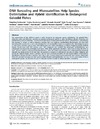Please use this identifier to cite or link to this item:
https://accedacris.ulpgc.es/handle/10553/43554
| Title: | DNA barcoding and microsatellites help species delimitation and hybrid identification in endangered galaxiid fishes | Authors: | Vanhaecke, Delphine Garcia de Leaniz, Carlos Gajardo, Gonzalo Young, Kyle Sanzana, Jose Orellana, Gabriel Fowler, Daniel Howes, Paul Monzon Argüello, Catalina Consuegra, Sofia |
UNESCO Clasification: | 2401 Biología animal (zoología) 2409 Genética |
Keywords: | Endangered species Microsatellite loci Mitochondrial DNA |
Issue Date: | 2012 | Journal: | PLoS ONE | Abstract: | The conservation of data deficient species is often hampered by inaccurate species delimitation. The galaxiid fishes Aplochiton zebra and Aplochiton taeniatus are endemic to Patagonia (and for A. zebra the Falkland Islands), where they are threatened by invasive salmonids. Conservation of Aplochiton is complicated because species identification is hampered by the presence of resident as well as migratory ecotypes that may confound morphological discrimination. We used DNA barcoding (COI, cytochrome b) and a new developed set of microsatellite markers to investigate the relationships between A. zebra and A. taeniatus and to assess their distributions and relative abundances in Chilean Patagonia and the Falkland Islands. Results from both DNA markers were 100% congruent and revealed that phenotypic misidentification was widespread, size-dependent, and highly asymmetric. While all the genetically classified A. zebra were correctly identified as such, 74% of A. taeniatus were incorrectly identified as A. zebra, the former species being more widespread than previously thought. Our results reveal, for the first time, the presence in sympatry of both species, not only in Chilean Patagonia, but also in the Falkland Islands, where A. taeniatus had not been previously described. We also found evidence of asymmetric hybridisation between female A. taeniatus and male A. zebra in areas where invasive salmonids have become widespread. Given the potential consequences that species misidentification and hybridisation can have for the conservation of these endangered species, we advocate the use of molecular markers in order to reduce epistemic uncertainty. | URI: | https://accedacris.ulpgc.es/handle/10553/43554 | DOI: | 10.1371/journal.pone.0032939 | Source: | PLoS ONE, v. 7 (3) (e32939) |
| Appears in Collections: | Artículos |
SCOPUSTM
Citations
38
checked on Jun 8, 2025
WEB OF SCIENCETM
Citations
33
checked on Jun 8, 2025
Page view(s)
70
checked on May 4, 2024
Download(s)
77
checked on May 4, 2024
Google ScholarTM
Check
Altmetric
Share
Export metadata
Items in accedaCRIS are protected by copyright, with all rights reserved, unless otherwise indicated.
